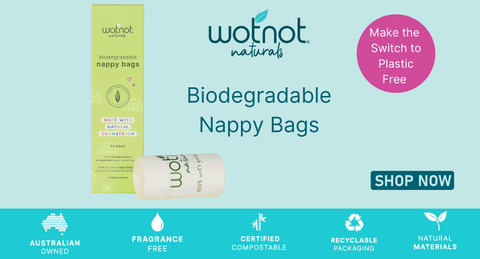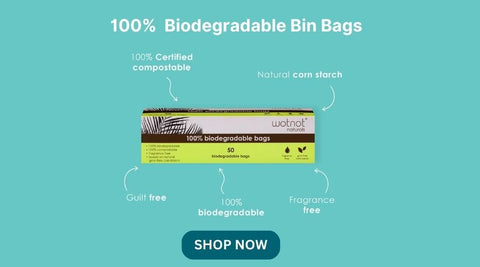What’s the difference between Degradable vs Biodegradable vs Compostable?
For Plastic Free July, Wotnot is focusing on the simple, positive steps we can take to be more effective guardians of the planet and create cleaner streets, oceans and a better world for our children.
It only takes a quick dash to the supermarket to see the abundance of plastics in our world. Shelves lined with plastic packaging, fruit and veg wrapped in plastic then bagged up in … (you guessed it), plastic shopping bags. It all adds up to a rather daunting world waste problem.
By the time it takes you to read this blog (5 minutes), 10 million plastic bags will have been used worldwide. It takes 1,000 years for plastic to degrade. This means all the plastic ever made is still out there! And the average life span of a plastic bag is… (wait for it) … only 12 minutes*
I hear you; the issue of plastics can feel overwhelming along with the state of the world at the moment.
It can feel hard to focus on making changes during these times, especially when life is busy or you’re a parent doing the endless juggle, but it’s all about baby steps. It’s a journey and every small positive change does count. So pat yourself on the back. You deserve it legend!
Right, let’s STOP, REGROUP and think about positive (baby) steps we can take for Plastic Free July.
To start with, let’s break down some confusing terminology around plastics & highlight some tips on how to make everyday choices to help our environment. Fighting the raging war on plastic can be as simple as starting with clear information so that people can make educated purchasing decisions and properly dispose of plastics at the end of use.
Ok, so let’s get to it. Not all ‘green’ bags are created equal.
When looking for greener choices, you will come across the terms, “Degradable”, “Biodegradable” and “Compostable”. Confusing labels and greenwashing can make it hard to work out what these terms mean & how they affect the environment.
These terms are often used interchangeably, but they are NOT the same. Biodegradable, Compostable and Degradable products are all made from different materials and deteriorate under their own distinct circumstances.
DEGRABABLE (aka Oxo-degradable) – WORST OPTION
Some plastic bags labelled ‘Green & Degradable’ are not environmentally friendly despite the marketing spin. ‘Degradable’ products commonly used for shopping and rubbish bags are a ticking timebomb for marine life because they are simply an ordinary plastic bag (polyethene) with a chemical additive that makes them break down faster into microplastics.
The name ‘Degradable’ often makes people think that the product will ‘degrade’ and go away, but they just shift into particle sized plastics creating more problems for the environment. When tiny plastic particles enter the marine environment, they can choke seabirds, poison wildlife and accumulate in the food chain, turning up in seafood eaten by us humans. I don’t know about you, but I’d prefer not to feed my family fish with a side of microplastics, thanks very much.
BIODEGRABABLE - BETTER
Biodegradable is a term given to material that as a result of microorganisms (bacteria and fungi), break down into the raw materials of nature from which it was made. They are made from plant-based materials like corn or wheat starch. The timeframe of how long this takes varies. Biodegradable will biodegrade, but generally not as quickly as compostable plastic. So, the best combination is 100% biodegradable and the disposal method is compostable. ** Wotnot Nappy Bags and Nappy Bin Bags are both 100% biodegradable & 100% composable.
COMPOSTABLE – BEST (GOLD STAR FOR YOU)
This is a specific term given to biodegradable material that biodegrades within a certain time frame under typical composting conditions. They are made from natural plant starch and do not produce any toxic material.
There’s a whole world of composting out there and much more to discover than what’s outlined in this quick breakdown on plastic terminology. Compositing can be a fascinating family project and a great way to educate yourself and your kids on the life cycle of materials.
THINGS TO REMEMBER
To sum up, when navigating the world of plastic, check the labels and choose Biodegradable and Compostable too (certified is best). This will mean that the product will break down to the materials of nature in the shortest time possible.
We’ve all used single use plastic bags at some point, let’s not beat ourselves up but instead start the journey of making positive baby steps for Plastic Free July.
May I suggest the DITCH and SWITCH approach.
DITCH one item of plastic such as single use plastic bags and SWTICH to another healthier option for the planet such as Wotnot’s biodegradable, compostable nappy bags & bin bags which are 100% biodegradable and 100% certified compostable.
Talking about your switch with your friends and the community will help reinforce the habit and educate others about the different types of terminology around plastic.
Alrighty, I think you’ve got this Plastic Free July in the bag! (Biodegradable, Certified Compostable bag that is). When you’re doing the shopping, a green reusable cloth bag is also a great choice. (Helpful tip: Put “remember bags” as the first item on your shopping list so you remember them) … Baby steps, we can do this.
Learn. Choose well. Pass it on.
Contributor – Marianne Randall
* https://ourgoodbrands.com/what-difference-degradable-biodegradable-compostable/
** http://www.youngscientist.com.au/wp-content/uploads/2017/02/degradablevsbiodegradable.pdf








